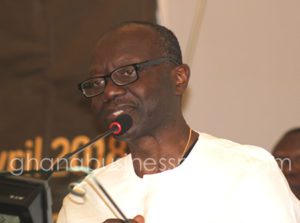Government’s initial equity contribution into Development Bank of Ghana is $250m – Ofori-Atta

Government aims to establish the Development Bank of Ghana (DBG) with an initial Government equity contribution of $250 million of which $200 million has already been paid.
It aims to increase DBG’s lending capacity by raising additional funds from domestic and international private and institutional investors.
Mr Ken Ofori-Atta, Minister of Finance, speaking at a press conference on the establishment of the bank, said the World Bank had provided $250 million and KfW of Germany had also provided €46.5 million.
The primary focus areas of DBG will be: Agribusiness, with a focus on off-farm value-chain activities, manufacturing, ICT, software, and allied services, including business-process outsourcing, and tourism boosting, home ownership through affordable and longer tenure Mortgage Finance.
He said Government was also talking to the AfDB to play part in the establishment of the bank and would pay back the loans that Government had taken on its behalf from the international financial institutions.
Mr Ofori-Atta said Government, therefore, saw its contribution to DBG as investments that should be paid back, “all the more reason we will insist on the professional management of the bank.”
He said the bank would be launched in July 2021 as part of one of the core pillars of the Ghana Cares programme aimed to achieve economic transformation that required that entrepreneurs in key productive sectors had access to long-term finance at affordable interest rates.
He said analysis done as part of the background technical work for establishing DBG, found that in Ghana, agriculture and manufacturing receive around 4 and 8 per cent, respectively in bank lending, and only about 15 per cent of bank loans exceeded five years in tenure.
The launch of DBG this year will address fundamental financing constraint and will provide loans with tenures of up to 15 years.
The Minister said DBG would be a wholesale bank, lending to retail banks to on-lend to SMEs and interest rates would be based on the need to support enterprises, while at the same time ensuring financial sustainability of the bank.
“DBG will also operate a partial guarantee window, and also a digital platform to facilitate factoring of invoices by SMEs,” he said.
Mr Ofori-Atta said Government, learning from its national experience and also from global experiences regarding development banks, was determined to set up DBG to stand the test of time and support Ghana’s economic transformation on a long-term basis.
He said Government had taken extraordinary measures to ensure that DBG was well capitalized, and it has a strong and independent governance structure, including competitive international recruitment of its Board and Senior Management.
This is to enable the bank to be run professionally and on a financially sustainable basis without recurrent recourse to the public purse.
He said it was Government’s plan to attract other shareholders, both domestic and international, so as to increase DBG’s capital base and also reduce the government’s share over time.
Source: GNA
